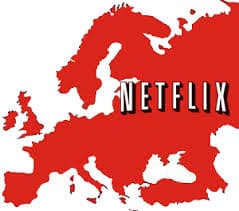Netflix (NFLX: $408/share) announced its plans to expand to six new European countries at midnight last Wednesday. Germany and France are the headline names from the announcement, with Austria, Switzerland, Belgium, and Luxembourg also in line to get access to the streaming video service by the end of this year.
European expansion was already expected from Netflix this year, but this plan appears to be bigger than the market expected. The market has reacted enthusiastically, driving NFLX stock up nearly 10% since the announcement. The six countries contain a combined population about half the size of the U.S., and investors are licking their chops at the opportunity for the company to boost its revenue growth.
Those investors should take a look at this recent New York Times article, which highlights the many difficulties NFLX will face in its attempted expansion. Some highlights are:
- NFLX won’t even have the rights to its signature piece of original content, “House of Cards”, in France, as Canal Plus already owns the French rights to the series.
- French laws also prohibit NFLX from streaming films until at least three years after they’re released in movie theaters, but they can be rented from a set-top box four months after their box office premiere.
- These European countries all have existing streaming services, often funded by large media entities. In Germany, Sky Deutschland has launched a streaming service that offers popular series like “Game of Thrones”. 21st Century Fox (FOXA) owns 54.5% of Sky Deutschland’s stock.
- Amazon Prime’s (AMZN) streaming service is already available in Europe.
Meanwhile, this expansion is sure to be a drag on profits just like prior expansions. NFLX’s international streaming segment contributed a loss of $274 million in 2013 and $389 million in 2012. This big expansion should push that loss even higher for a few years. And it is not like we can expect big margins once the initial expansion is complete. The increased competition and difficulties associated with operating internationally should keep margins lower even than in the U.S.
And then what? Reed Hastings has said he wants 80% of NFLX’s revenue to come from outside the U.S. That would require Netflix to cover all of Europe, and then expand into Asia, Latin America, and the Middle East, with all the attendant regulatory and linguistic issues such an expansion would entail.
We’re talking about a decade or more of money-losing international expansion, and all the while content costs continue to increase. Are there any profits at the end of these expansion rainbows? These expansions might not ever produce profits if content costs continue to rise as we expect.
The true sign of a bubble stock is when investors see only opportunity without factoring in any of the risk, which is exactly what’s happened with NFLX. With this European expansion, bulls are dreaming of revenue growth and a global streaming giant without factoring in the significant hurdles NFLX faces and the high costs it will incur.
When writing about Workday (WDAY) recently I made the comparison of the cloud sector to previous disruptive industries like automobiles and personal computers. The comparison is apt for streaming video as well. This industry is still relatively young, and competition is increasing every day. NFLX might have been one of the first movers, but now it is one of many in the US and globally. Margins are declining rapidly, and we see no signs of that trend reversing.
NFLX bulls excited by the company’s European expansion should temper their enthusiasm. International expansion in the near-term means higher costs, lower cash flows, and potential downward catalysts for the stock if regulatory hurdles or increased competition holds growth below expectations. Even if NFLX does gain significant adoption in Europe, increasing content costs should keep profit margins low.
NFLX has recovered in May after being hit hard in March and April, but investors shouldn’t be fooled into thinking the risk has gone out of this stock. NFLX remains dangerously overvalued and could drop a long ways before reaching a level supported by reasonable expectations of future cash flows.
Sam McBride contributed to this report.
Disclosure: David Trainer and Sam McBride receive no compensation to write about any specific stock, sector, or theme.
